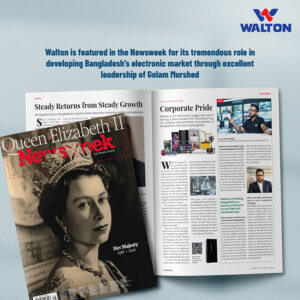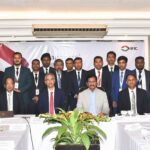 Press Release: Walton is the corporate pride of Bangladesh. The electronics juggernaut is setting a new standard for manufacturing. It is already revolutionized consumption in Bangladesh and now going global.
Press Release: Walton is the corporate pride of Bangladesh. The electronics juggernaut is setting a new standard for manufacturing. It is already revolutionized consumption in Bangladesh and now going global.
Renowned US weekly magazine Newsweek, in a recent report says these on Walton. The magazine, in the latest issue, has highlighted Bangladesh’s incredible economic development of last twelve years (2009 to 2021), strong leadership of Prime Minister Sheikh Hasina, stable capital market and the contribution of Walton in country’s industrial development.
The report says that Bangladesh’s GDP was $102.37 billion in 2009 which has increased to $416.26 billion in 2021. From 2010 to 2020, Bangladesh achieved the world’s highest cumulative GDP growth. In a decade and a half, it lifted more than 25 million people out of poverty. Last year, the UN confirmed that Bangladesh would graduate from the least developed countries category by 2026, making it just one of a handful of countries to do so. According to government plans, the country is on track to become a developed nation by 2041.
Since becoming independent in 1971, Bangladesh has steadily progressed from the second-poorest country in the world to being proclaimed “a model for poverty reduction” by the World Bank, all while remaining democratic and committed to protecting human rights and the environment. Stable democracy, infrastructural development, attracting more domestic and foreign investment, export earnings all these factors were the keys to maintain the growth even in the pandemic. According to World Bank, the GDP per capita of Bangladesh in 2021 was $2,503 while it was $2,277 in India. Besides being home to the world’s second-largest readymade garment sector, the country’s leather, jute, IT services, pharmaceutical, agriculture and high-tech export sectors are all on the rise. The Asian Development Bank forecasts GDP growth of 6.9% in 2022 and 7.1% in 2023.
Sheikh Hasina and her nation have defied the odds. Under her strong leadership, Bangladesh solidified itself as a stable democracy while drastically improving its citizens’ quality of life. Amid global turmoil, Bangladesh’s capital markets have been marked by stability and optimism. Bangladesh Securities and Exchange Commission (BSEC) Chairman Prof Shibli Rubayat-Ul-Islam also featured in the Newsweek issue.
Prime Minister Sheikh Hasina, in her interview with the magazine, said that innovation and entrepreneurship were at the heart of her development vision.
In the same issue, Newsweek says that Walton’s spectacular growth runs parallel to that of its country of origin. Before the company began manufacturing its first refrigerators in 2008, the appliances were essentially luxury products in Bangladesh. Fast forward to today, and fridges have become commonplace in the homes of the increasingly prosperous local population, with the market growing ten fold in the last 10 years. The company, the first Bangladeshi manufacturer of mobile phones, compressors, air conditioners, televisions, laptops and elevators, has likewise helped those products take similar journeys in the domestic market. Beyond taking Bangladesh’s electronics and appliance market from import-oriented to self-reliant, Walton has big plans for the rest of the world. Already the company, with a work-force of more than 30,000 employees and 700 acres of production space, is making moves to become a global leader by 2030.
In 2020, the Bangladeshi electronics giant struck a deal with an undisclosed US mobile phone brand to supply its smartphones. In April 2022, it acquired three European compressor brands. This year, it also opened a groundbreaking research and development center in South Korea. In total, Walton has a presence in 40 markets, with the strongest market penetration in Southeast Asia, the Middle East and West Africa. Walton’s aim is not only to expand its business and offer high-quality products, but to solidify Bangladesh as a giant in the high-tech industry.
In an interview published on the Newsweek, Golam Murshed, Managing Director and CEO of Walton Hi-Tech Industries PLC., said that Walton saves enormous amounts of foreign currency by producing import substitute products, creates significant employment along with backward linkage industry and contributes to export earnings. However, the most important is country branding. Walton is branding Bangladesh as a country of electronics and high-tech manufacturing.
He further said: Walton is very much committed to protecting the environment. We don’t use hazardous substances that harm the environment. Walton is also the first enterprise in the world to successfully implement Hydrofluorocarbon (HFC) and Hydrochlorofluorocarbon (HCFC) phase-out projects. Less energy consumption means less environmental pollution, which is why Walton also continues to produce more energy efficient products. At the same time, we use environmentally friendly refrigerants in our compressors and are implementing more renewable energy for our production.
The Walton CEO highlighted that without innovation, no enterprise can be sustainable. He said: We’ve had a strong research and development department from the very beginning. We made the world’s first offline voice command air conditioner and the first ever air conditioner that features Bluetooth, air plasma and 3-in-1 converter technology. At the same time, we introduced Bangladesh’s first smart refrigerator, television, air conditioner, voice command television and Google-certified Android television.







